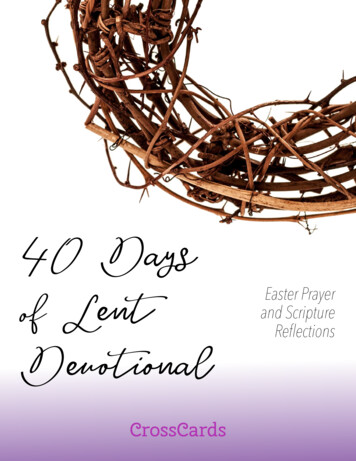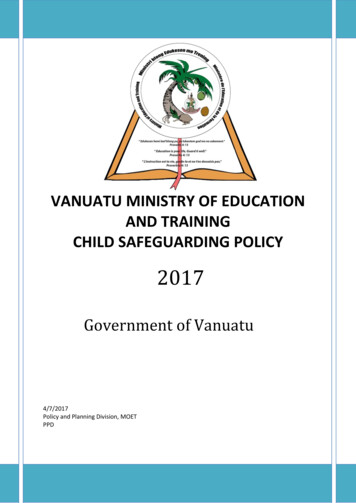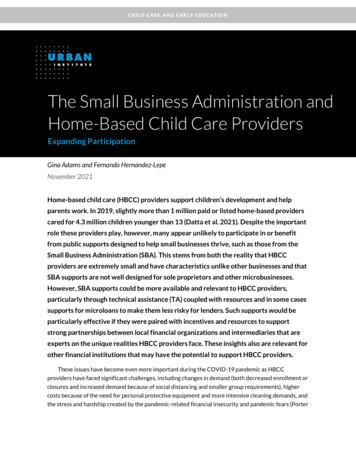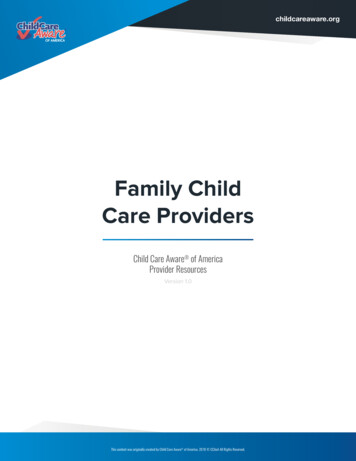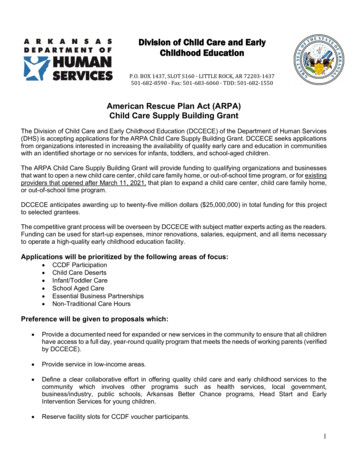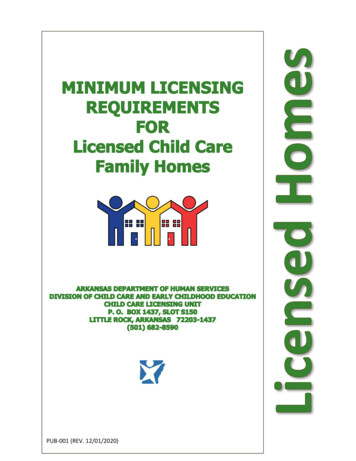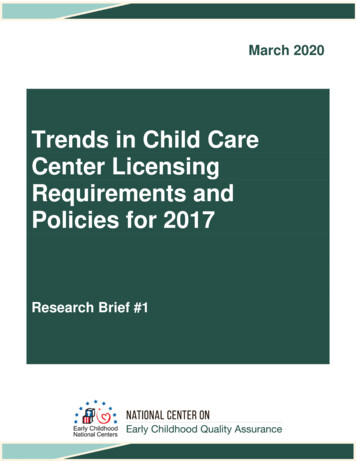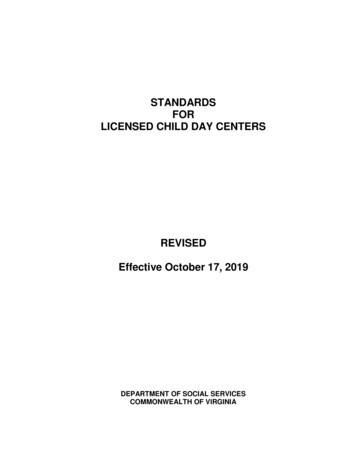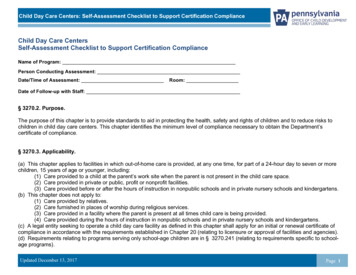
Transcription
Child Day Care Centers: Self-Assessment Checklist to Support Certification ComplianceChild Day Care CentersSelf-Assessment Checklist to Support Certification ComplianceName of Program:Person Conducting Assessment:Date/Time of Assessment:Room:Date of Follow-up with Staff:§ 3270.2. Purpose.The purpose of this chapter is to provide standards to aid in protecting the health, safety and rights of children and to reduce risks tochildren in child day care centers. This chapter identifies the minimum level of compliance necessary to obtain the Department’scertificate of compliance.§ 3270.3. Applicability.(a) This chapter applies to facilities in which out-of-home care is provided, at any one time, for part of a 24-hour day to seven or morechildren, 15 years of age or younger, including:(1) Care provided to a child at the parent’s work site when the parent is not present in the child care space.(2) Care provided in private or public, profit or nonprofit facilities.(3) Care provided before or after the hours of instruction in nonpublic schools and in private nursery schools and kindergartens.(b) This chapter does not apply to:(1) Care provided by relatives.(2) Care furnished in places of worship during religious services.(3) Care provided in a facility where the parent is present at all times child care is being provided.(4) Care provided during the hours of instruction in nonpublic schools and in private nursery schools and kindergartens.(c) A legal entity seeking to operate a child day care facility as defined in this chapter shall apply for an initial or renewal certificate ofcompliance in accordance with the requirements established in Chapter 20 (relating to licensure or approval of facilities and agencies).(d) Requirements relating to programs serving only school-age children are in § 3270.241 (relating to requirements specific to schoolage programs).NUMPAGES 38}Updated December 13, 2017Updated December 12, 2017Page 1
Child Day Care Centers: Self-Assessment Checklist to Support Certification Compliance§ 3270.4. Definitions.The following words and terms, when used in this chapter, have the following meanings, unless the context clearly indicatesotherwise:ACIP — The Advisory Committee on Immunization Practices of the Centers for Disease Control and Prevention, United StatesDepartment of Health and Human Services.Act — The Public Welfare Code (62 P. S. § § 101—1411).Age level — The grouping category appropriate for the child’s age.(i) Infant—A child from birth to 1 year of age.(ii) Young toddler—A child from 1 to 2 years of age.(iii) Older toddler—A child from 2 to 3 years of age.(iv) Preschool child—A child from 3 years of age to the date the child enters kindergarten in a public or private school system.(v) Young school-age child—A child who attends kindergarten to the date the child enters the 4th grade of a public or privateschool system.(vi) Older school-age child—A child who attends the 4th grade of a public or private school system through 15 years of age.CPS — Child Protective Services.CPSL — Child Protective Services Law—Title 23 of the Pennsylvania Consolidated Statutes Chapter 63 (relating to the ChildProtective Services Law).CRNP — Certified Registered Nurse Practitioner.Casual contact — The ordinary, routine and age-appropriate association of children, parents and facility persons in the course of dailyassembly in a facility.Certificate of compliance — A document issued by the Department to a legal entity permitting the entity to operate a specific type offacility at a specific location for a specific period of time according to applicable Department regulations. A certificate of complianceapproves the operation of a facility subject to Article IX of the act (62 P. S. § § 901—922) or licenses the operation of a facility subjectto Article X of the act (62 P. S. § § 1001—1087).Child — A person 15 years of age or younger.NUMPAGES 38}Updated December 13, 2017Updated December 12, 2017Page 2
Child Day Care Centers: Self-Assessment Checklist to Support Certification ComplianceChild abuse — Serious physical or mental injury which is not explained by the available medical history as being accidental; sexualabuse or sexual exploitation; or serious physical neglect of a child if the injury, abuse or neglect of a child has been caused by the actsor omissions of the child’s parent, by a person responsible for the child’s welfare, by an individual residing in the same home as thechild or by a paramour of a child’s parent. A child will not be deemed to be physically or mentally abused for the sole reason that thechild is in good faith being furnished treatment by spiritual means through prayer alone in accordance with the tenets and practices ofa recognized church or religious denomination by an accredited practitioner thereof or is not provided specified medical treatment inthe practice of religious beliefs or solely on the grounds of environmental factors which are beyond the control of the personresponsible for the child’s welfare, such as inadequate housing, furnishings, income, clothing and medical care.Child care experience — Care for a child in lieu of care by the parent or guardian for part of a 24-hour day. The term includes care offoster children in a court-supervised arrangement. The term does not include care of related children who reside with an individual.The term does not include supervised onsite training in the case of a student who is fulfilling the requirements of a secondary orpostsecondary child care training or educational curriculum.Child day care center — The premises in which care is provided at any one time for seven or more children unrelated to the operator.Child with special needs — A child who has one or more of the following:(i) A disability or developmental delay identifies on an IEP, an IFSP or a service agreement.(ii) A written behavioral plan that has been determined by a licensed physician, licensed psychologist or certified behavioranalyst.(iii) A chronic health condition diagnosed by a licensed physician, physician’s assistant or CRNP that requires health andrelated services of a type or amount beyond that required by children generally.Communicable disease — An illness due to an infectious agent or its toxic products which is transmitted directly or indirectly by theinfected agent to a susceptible host. Communicable diseases are specified in 28 Pa. Code Chapter 27 (relating to communicable andnon-communicable diseases).Department — The Department of Human Services of the Commonwealth.Facility — A child day care center.Facility person — A staff person, a substitute staff person, a volunteer, a food service person, a janitorial person or another adult whoserves in or is employed by a facility.NUMPAGES 38}Updated December 13, 2017Updated December 12, 2017Page 3
Child Day Care Centers: Self-Assessment Checklist to Support Certification ComplianceFire protection professional — An individual knowledgeable and competent in fire inspections, fire detection, fire suppression systemsand practices, fire service training, emergency preparedness planning and emergency evacuation whose competence is demonstratedby membership in a professional organization which promotes firesafety education.Group — Children assigned to the care of one or two staff persons. A group occupies a space or a defined part of a space.IEP — Individualized education program as defined in 22 Pa. Code § § 14.101 and 14.131—14.133 (relating to definitions; and IEP).IFSP — Individualized family service plan as defined in § § 4226.5 and 4226.71—4226.77 (relating to definitions; and IFSPs).Inspection summary — A document prepared by an agent of the Department describing each regulatory noncompliance itemconfirmed as a result of a facility inspection.Legal entity — A person, society, corporation, governing authority or partnership that is legally responsible for the administration of onefacility or several facilities, or one type of facility or several types of facilities.Night care — Care for a child between the hours of 7 p.m. and 7 a.m.Operator — The legal entity or a person designated by the legal entity to serve as the facility director.Parent — The biological or adoptive mother or father or the guardian of the child.Potentially hazardous food — A food that consists in whole or in part of milk or milk products, eggs, meat, poultry, fish, shellfish orother ingredients capable of supporting rapid and progressive growth of infectious or toxigenic microorganisms.Public water system — A system for the provision to the public of water for human consumption that has at least 15 serviceconnections or regularly serves an average of at least 25 individuals daily at least 60 days out of the year. The term includes:(i) Collection, treatment, storage and distribution facilities under the control of the operator of the system and used inconnection with the system.(ii) Collection or pretreatment storage facilities not under control of the operator which are used in connection with the system.(iii) A system which provides water for bottling or bulk hauling for human consumption.NUMPAGES 38}Updated December 13, 2017Updated December 12, 2017Page 4
Child Day Care Centers: Self-Assessment Checklist to Support Certification ComplianceRelative — A parent, child, stepparent, stepchild, grandparent, grandchild, brother, sister, half brother, half sister, aunt, uncle, niece ornephew. As applied to facilities subject to approval under Article IX of the act, the term also includes a stepbrother, stepsister or firstcousin.School-age care — Supervised child day care in a Departmentally certified facility during the hours when a child is not required toattend school.Service agreement — A service agreement as defined in 22 Pa. Code § § 15.2 and 15.7 (relating to definitions; and serviceagreement).Space — Indoor or outdoor area designed for child care that is large enough to accommodate the maximum number of childrenallowed under this chapter. A space may be used by more than one group of children.Staff person — A person included in the regulatory ratio who is responsible for child care activities.Supervise — To be physically present with a group of children or with the facility person under supervision. Critical oversight in whichthe supervisor can see, hear, direct and assess the activity of the supervisee.Volunteer — A person 16 years of age or older who is not included in the regulatory ratio and who assists in implementing dailyprogram activities under the supervision of a staff person.Waiver — The Department’s written exemption from the requirement of meeting a standard in this chapter.Year — For purposes of calculating, 1 year of child care experience is a minimum of 1,250 clock hours.NUMPAGES 38}Updated December 13, 2017Updated December 12, 2017Page 5
Child Day Care Centers: Self-Assessment Checklist to Support Certification ComplianceTable of ContentsGENERAL REQUIREMENTS . 7FACILITY PERSONS . 10STAFF:CHILD RATIO . 15PHYSICAL SITE . 17FIRE SAFETY . 23PROGRAM . 26PROCEDURES FOR ADMISSION . 29CHILD HEALTH . 31ADULT HEALTH . 36NUTRITION . 38TRANSPORTATION . 40CHILD RECORDS . 42ADULT RECORDS . 43HEAD START PROGRAMS . 44SPECIAL EXCEPTIONS . 45SCHOOL-AGE PROGRAMS . 45NUMPAGES 38}Updated December 13, 2017Updated December 12, 2017Page 6
Child Day Care Centers: Self-Assessment Checklist to Support Certification ComplianceGENERAL REQUIREMENTS§ 3270.17. Service to a child with special needs.(a) The operator shall make reasonable accommodation to include achild with special needs in accordance with applicable Federal and Statelaws.(b) The operator shall permit an adult individual who providesspecialized services to a child with special needs to provide thoseservices on the facility premises as specified in the child’s IEP, IFSP orwritten behavioral plan.(c) The operator shall make staff persons and parents aware ofcommunity resources for the family of a child who may have specialneeds. The Department will provide to the operator informationregarding community resources.§ 3270.18. Liability Insurance.(a) The legal entity shall have comprehensive general liability insuranceto cover the persons who are on the premises. A current copy of theinsurance policy shall be on file at the facility.(b) The operator shall report to the Department liability insurance claimsbrought against the operator or a facility person.(c) A liability insurance claim report shall include the followinginformation:(1) A detailed description of the claim.(2) The name, address and telephone number of the facility.(3) The name, address and birth date of the claimant.§ 3270.19. Child abuse reporting.MetPlan of ActionDate forCorrectionMetPlan of ActionDate forCorrectionMetPlan of ActionDate forCorrection(a) An operator or a staff person who has reason to believe that a childenrolled in the facility has been abused is required to report suspectedchild abuse to ChildLine as mandated by the CPSL.(b) A staff person may be designated by the operator as the personresponsible to notify ChildLine of suspected child abuse. The operator ordesignated staff person with this responsibility shall immediately notifyChildLine at 1 (800) 932-0313.(c) Within 48 hours, a written report regarding the suspected child abuseshall be submitted by the operator or designated staff person to the CPSunit which has responsibility for investigating the report.NUMPAGES 38}Updated December 13, 2017Updated December 12, 2017Page 7
Child Day Care Centers: Self-Assessment Checklist to Support Certification Compliance§ 3270.20. Reporting injury, death or fire.(a) The operator shall immediately notify a child’s parent and shalltelephone notice to the appropriate regional office of the Departmentwithin 24 hours if one or more of the following occurs:(1) Inpatient hospitalization or emergency room treatment of a childreceiving care at the facility.(2) A death of a child receiving care at the facility.(3) A facility fire that requires the service of a fire department.(b) The operator shall mail or deliver a written report to the appropriateregional office of the Department within 72 hours after the occurrence ofan event listed in subsection (a).(c) The report shall include the following information:(1) The name, address and telephone number of the facility.(2) The name, address and birth date of the child.(3) The name and address of the child’s parent or guardian.(4) A description of the incident, including the date, time and location ofthe incident and the equipment involved.(5) The name and telephone number of local authorities notified.(6) The nature of the treatment.(7) The name and address of the place where the treatment wasreceived.(8) The required follow(d) The staff person who prepared the report shall sign and date it.(e) Copies of reports shall be kept in a file at the facility.The facility operator shall make reports to a child’s parent and to theDepartment in accordance with § 3270.20 (relating to reporting injury,death or fire) if one or more of the following occurs:(1) A child receiving care in the facility is lost or missing from thefacility.(2) A child in the care of the facility is left behind on a facility excursion.(3) A child receiving care in the facility is left unattended in the facilitywhen the facility is closed.§ 3270.21. General health and safety.Conditions at the facility may not pose a threat to the health or safety ofthe children.§ 3270.22. Communication with parents.MetPlan of ActionDate forCorrectionMetPlan of ActionDate forCorrectionMetPlan of ActionDate forCorrectionThe operator shall establish oral or written communication in thelanguage or mode of communication which is understandable to theparent.NUMPAGES 38}Updated December 13, 2017Updated December 12, 2017Page 8
Child Day Care Centers: Self-Assessment Checklist to Support Certification Compliance§ 3270.23. Parent access and participation.A parent of a child in care shall be permitted free access, without priornotice, throughout the center whenever children are in care, unless acourt of competent jurisdiction has limited the parental right of access tothe child and a copy of the order is on file at the facility. Opportunity shallbe provided for parents to participate in the facility’s program. Theoperator shall maintain a yearly file which documents generalannouncements to promote parent participation. The file shall beupdated annually.§ 3270.24. Departmental access.(a) A staff person shall provide to agents of the Department immediateaccess to the facility and, upon request, to the children and the files andrecords.§ 3270.25. Availability of certificate of compliance and applicableregulations.(a) The facility’s current certificate of compliance and a copy of theapplicable regulations under which the facility is certified shall be postedin a conspicuous location used by parents, with instructions forcontacting the appropriate regional day care office posted at the samelocation.(b) The operator shall post a copy of each inspection summary issuedby the Department in a conspicuous location used by parents. Theinspection summary must remain posted until an agent of theDepartment verifies that each regulatory noncompliance item cited onthe inspection summary has been corrected.§ 3270.27. Emergency plan.MetPlan of ActionDate forCorrectionMetPlan of ActionDate forCorrectionMetPlan of ActionDate forCorrectionMetPlan of ActionDate forCorrection(a) The facility shall have an emergency plan that provides for:(1) Shelter of children during an emergency including shelter in place atthe facility and shelter at locations away from the facility premises.(2) Evacuation of children from the facility building and evacuation ofchildren to a location away from the facility premises. The evacuationroutes and evacuation plans to exit the building may be the same asthose required by § 3270.94(f) and (g) (relating to fire drills).(3) A method for facility persons to contact parents as soon asreasonably possible when an emergency situation arises.(4) A method for facility persons to inform parents that the emergencyhas ended and to provide instruction as to how parents can safely bereunited with their children.NUMPAGES 38}Updated December 13, 2017Updated December 12, 2017Page 9
Child Day Care Centers: Self-Assessment Checklist to Support Certification Compliance(b) The operator shall review the emergency plan at least annually andupdate the plan as needed. Each review and update of the emergencyplan shall be documented in writing and kept on file at the facility.(c) Each facility person shall receive training regarding the emergencyplan at the time of initial employment, on an annual basis and at the timeof each plan update. The date of each training and the name of eachfacility person who received the training shall be documented in writingand kept on file at the facility.(d) The emergency plan shall be posted in the facility at a conspicuouslocation.(e) The operator shall provide to the parent of each enrolled child aletter explaining the emergency procedures described in subsection (a).The operator shall also provide to the parent of each enrolled child aletter explaining any subsequent update to the plan.(f) The operator shall send a copy of the emergency plan andsubsequent plan updates to the county emergency managementagency.FACILITY PERSONSMet§ 3270.31. Age and training.Plan of ActionDate forCorrection(a) A volunteer shall be 16 years of age or older and shall be directlysupervised at all times.(b) A staff person shall be 18 years of age or older.(c) An individual 16 years of age or older who is enrolled in anapproved training curriculum may be used as a staff person, if thefollowing guidelines are met:(1) The curriculum is conducted by an institution approved by theDepartment of Education and accredited by an accrediting agencyrecognized by the United States Department of Education or theCouncil on Postsecondary Education and acceptable to the Departmentof Education.(2) The curriculum includes acceptable training topics referenced insubsection (e)(2).(3) The curriculum includes a minimum total of 600 clock hours,distributed as follows:(i) A minimum of 400 clock hours of classroom training.(ii) A minimum of 200 clock hours of supervised training in a childday care facility.(4) A representative of the training institution certifies in writing that theindividual has completed the required classroom training and isNUMPAGES 38}Updated December 13, 2017Updated December 12, 2017Page 10
Child Day Care Centers: Self-Assessment Checklist to Support Certification Compliancecurrently enrolled in the curriculum.(5) The written certification required in paragraph (4) shall be retainedin the staff file at the facility.(d) Child care professional credentials are equivalent to the staffqualifications:(1) A Child Development Associate (CDA) credential or a CertifiedChildcare Professional (CCP) credential is equivalent to 9 credit hoursfrom an accredited college or university in early childhood education orchild development and 1 year of experience with children.(2) A Pennsylvania school-age professional credential is equivalent to9 credit hours from an accredited college or university in elementaryeducation or child development and 1 year of experience with children.(e) A staff person shall obtain an annual minimum of 6 clock hours ofchild care training.(1) Acceptable training is conducted in one or more of the followingsettings:(i) By a secondary or postsecondary institution approved by theDepartment of Education and accredited by an accrediting agencyrecognized by the United States Department of Education or theCouncil of Postsecondary Accreditation and acceptable to theDepartment of Education.(ii) By an entity that is licensed or certified professionally competentin the training topic.(iii) In conferences or workshops.(iv) With audio-visual materials recognized by child careprofessionals.(2) Acceptable training topics include the following:(i) Child or staff health.(ii) Child development, early childhood education and specialeducation.(iii) Supervision, discipline and guidance of children.(iv) Nutrition for children.(v) Child care program development.(vi) Child care staff person or volunteer professional development.(3) Other training topics may be submitted for the Department’sreview and approval.(4) Depending on the provisions of the appropriate regulation, trainingmay be required for certain staff persons. The following constitutescompetence in training areas:(i) First-aid training. Competence is the completion of training by aNUMPAGES 38}Updated December 13, 2017Updated December 12, 2017Page 11
Child Day Care Centers: Self-Assessment Checklist to Support Certification Complianceprofessional in the field of first-aid. First-aid training will be renewed onor before expiration of certification or every 3 years, as applicable.(ii) Fire safety training. Staff persons shall participate, at leastannually, in fire safety training conducted by a fire protectionprofessional. Staff persons and volunteers shall receive training inmaintenance of smoke detectors, the duties of facility persons during afire drill and during a fire and the use of the facility’s fire extinguishers,not including discharge of the fire suppressant agent.(iii) Lifeguard training. Competence is the completion of lifeguardtraining, including first-aid training and cardiopulmonary resuscitation(CPR) for child and infant.(iv) Water safety instruction. Competence is the completion of basicinstruction in water safety from a certified lifeguard.(f) Completion of training shall be documented by the signature andtitle of a representative of the training entity and include the datetraining was completed. Documentation shall be retained in the facilityperson’s file.§ 3270.33. General requirements for facility persons.(a) A staff person or a substitute staff person shall meet one of theapplicable staff qualifications for the position in which the person isperforming.(b) At least 50% of the staff persons in a facility shall be individualsqualified and functioning as directors, group supervisors and assistantgroup supervisors. No more than 50% of the staff persons may be ofaide qualification level.(c) A volunteer shall be supervised by a staff person who is qualified atminimum as an assistant group supervisor.(d) One or more facility persons competent in first-aid techniques shallbe at the facility when one or more children are in care.§ 3270.34. Director qualifications and responsibilities.MetPlan of ActionDate forCorrectionMetPlan of ActionDate forCorrection(a) A director is responsible for the general management of the facility,including the following minimum duties:(1) Administering finances, personnel, maintenance, meal planningand preparation and transportation.(2) Administering the facility’s program objectives and activities.(3) Designating a staff person who is responsible for compliance withthis chapter in the Director’s absence.(4) Coordinating and planning daily activities with the groupsupervisors or with the assistant group supervisors in school-ageprogram.NUMPAGES 38}Updated December 13, 2017Updated December 12, 2017Page 12
Child Day Care Centers: Self-Assessment Checklist to Support Certification Compliance(5) Overall program planning.(6) Written evaluation of staff persons on a regular basis, a minimum ofone evaluation every 12 months.(b) A director shall have attained one of the following qualificationlevels:(1) A bachelor’s degree from an accredited college or university inearly childhood education, child development, special education,elementary education or the human services field and 1 year ofexperience with children.(2) A bachelor’s degree from an accredited college or university,including 30 credit hours in early childhood education, childdevelopment, special education, elementary education or the humanservices field and 2 years of experience with children.(3) An associate’s degree from an accredited college or university inearly childhood education, child development, special education,elementary education or the human services field and 3 years ofexperience with children.(4) An associate’s degree from an accredited college or university,including 30 credit hours in early childhood education, childdevelopment, special education, elementary education or the humanservices field and 4 years of experience with children.(c) A director shall be employed by a facility and be present at thefacility site a minimum of 30 hours per week.(d) In a facility in which 45 or fewer children are enrolled, a directormay also function as a group supervisor. An individual who functions ina dual capacity shall meet the responsibilities and qualifications of adirector set forth in subsect
Act — The Public Welfare Code (62 P. S. § § 101—1411). Age level — The grouping category appropriate for the child's age. (i) Infant—A child from birth to 1 year of age. (ii) Young toddler—A child from 1 to 2 years of age. (iii) Older toddler—A child from 2 to 3 years of age.

![Welcome [dashdiet.me]](/img/17/30-day-weight-loss-journal.jpg)
